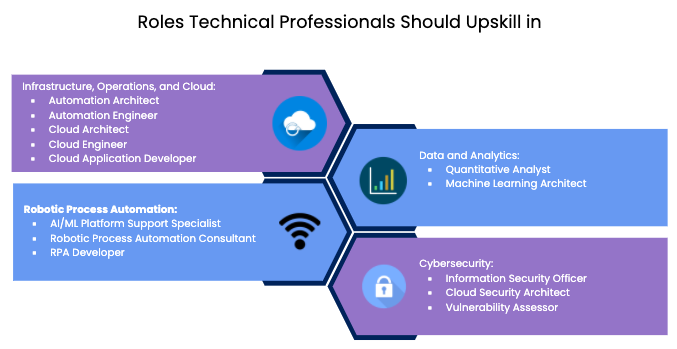Do you often ask yourself, “Do I have the skills to survive in the post-pandemic economy?”
When the pandemic began, some infrastructure that we barely knew about became of significant importance. Microsoft’s Teams and Zoom came into the picture, and even Google created Meet to enable people to work from home safely.
You must think about all the technology and infrastructure that enabled us. There are a thousand tech professionals working behind the scene, and accelerating the growth. Artificial intelligence/machine learning (AI/ML), cloud computing, cybersecurity, data and analytics, and a number of other technologies have helped us stay close while being physically distant.
However, as we have started emerging out of this ‘pandemic pause’, we must also acknowledge the knowledge we had before is not going to suffice as the world unpauses. This is why this is an opportune moment for all of us to reflect on our existing skills and prepare for what is to come.
The first step technical professionals should take in this process is to assess their skills and identify the gaps. With this done, you can, then prepare candidates for upskilling and re-skilling for any new roles or responsibilities that may arise when the recovery phase begins.

In this blog, we’d be discussing these graduate training program (GTP) research topics that technical professionals will require for the new normal.
Infrastructure, Operations, and Cloud:
With the increased need for infrastructure and operations, especially over the Cloud, there is a high increase in the skills required for automation of these operations as well.
Operations are repetitive in nature and high in volume. They need a quick turnaround time, which needs automation.
Some of the skills one should focus on are:
- Infrastructure as Code ( IaC ), e.g., Azure Resource Manager Template, AWS CloudFormation, and Terraform
- Configuration Management Tools, e.g., Puppet, Ansible, Chef, etc.
- Scripting Languages, e.g., Bash, Python, Powershell
Also Read: How to upskill outrageously well in an age of WFH?
Data and Analytics:
This domain has been the key focus area in the last few years and would be a trend in the future as well. Data and analytics aren’t aftermaths anymore; advanced analytics is supported by artificial intelligence and machine learning, making it a key driver for vital business strategies.
Even then, we often hear data professionals need to learn how to “think data”. It is for these reasons, the skills of quantitative analysts will become primarily important.
To ace your role as a quantitative analyst, you must learn:
- Big data modeling
- Excel modeling
- Abstract reasoning
The increased use of artificial intelligence and machine learning is creating new roles. And one of the bridges the gap between science and engineering: machine learning architect. Technical professionals in this role are responsible for designing, facilitating, directing, and spearheading machine learning initiatives as part of data science and AI initiatives.
Cybersecurity:
While the cybersecurity employment gap is just as prominent as ever, the pandemic has shown its increasing demand. The focus during this time has been on how to tighten the security on the cloud and extend to employees working remotely. Moreover, with organizations planning to move a completely remote work setup or hybrid work setup, tightening cybersecurity has become mission-critical.
Upskilling as a cybersecurity expert, you need to determine in which domain you want to excel.
Architecture and strategy include skills like business architecture, cloud security architecture methods, and cloud risk management; whereas technical skills include cloud identity and access management, cloud DevSecOps, and container service security.
Also Read: 7 Steps To Implement Upskilling Program In Your Organization
Robotic Automation Process:
An increase in insurance claims, reduction in staff due to inevitable layoffs, COVID-related treatments of self/relatives, and the necessity to work from home have increased the need for Business Process Automation more than ever.
There would be a shortage of staff to handle the incoming loads in many types of businesses either. As a result, Robotic Process Automation (RPA), which is one of the key technical ways of automating processes has increased demand.
Knowledge of one of the leading RPA tools like UiPath, Automation Anywhere, Blue Prism is a must-have. Some of these vendors also provide free training courses and certifications on their tools.
We’ve taken out these four categories keeping in mind the digital acceleration this year has witnessed, and what can be anticipated from this acceleration. This list, however, isn’t exhaustive; there are and will be more functions and skills technical professionals would have to include in upskilling and re-skilling in candidates.


